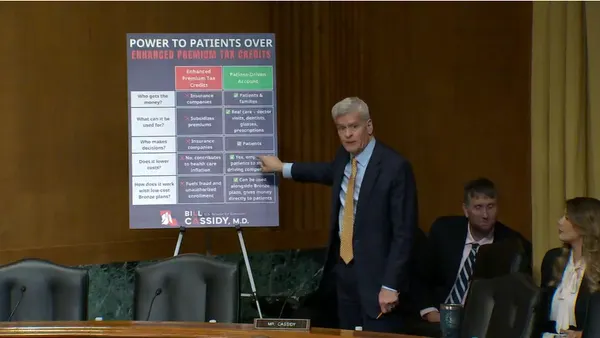Dive Brief:
- The Food and Drug Administration on Tuesday approved a drug-device combination for bladder cancer that its developer, Johnson & Johnson, claims represents “a new, potentially practice-changing approach.”
- The treatment, which J&J will sell as Inlexzo, is a medical device that releases the chemotherapy gemcitabine into the bladder. It’s approved for use in people whose disease hasn’t yet spread but doesn’t respond or stopped responding to a commonly used immunotherapy. Historically, those patients have had have their bladders surgically removed.
- J&J executives have predicted Inlexzo will achieve blockbuster sales, and highlighted how the company’s internal sales estimates are more than three times higher than Wall Street’s predictions. “We really think that we've got a winner there,” Jennifer Taubert, the head of the company’s pharmaceuticals business, said on a conference call in July.
Dive Insight:
Johnson & Johnson gained Inlexzo, formerly known as TAR-200, when it acquired privately held Taris Biomedical in 2019.
The deal gave J&J a treatment it says could change way the “non-muscle invasive” form of bladder cancer — when cancer cells haven’t yet spread beyond the bladder’s inner lining — is treated. Patients with this disease typically receive a type of immunotherapy known as BCG. But there are limited options for those who don’t respond or see their cancers return. Many have their bladders removed.
Inlexzo could help patients avoid that outcome. Doctors insert Inlexzo with a catheter into the bladder, where it releases the chemotherapy gemcitabine. After three weeks, the device is removed and replaced with a new one that lasts up to six months. Afterwards, newer devices are implanted every 12 weeks for up to 18 months.
In clinical testing, Inlexzo eliminated tumors in 82% of people enrolled in a clinical trial. About half maintained that response for at least one year. In a similar setting, Merck & Co.’s Keytruda — which is also approved for non muscle-invasive bladder cancer — drove away tumors in 41% of people who got it, although the two products haven’t been tested head-to-head.
“The data that we've presented there looks fabulous,” Taubert told analysts during the July conference call. “We've really designed this product by urologists, for urologists to seamlessly fit into routine clinical practice.”
In a client note that month, Leerink Partners analyst David Risinger wrote that the company’s ambitious revenue projections suggest J&J believes Inlexzo will record $2.4 billion in sales in 2028.
But Inlexzo faces competition. Since 2020, the FDA has approved Keytruda, a gene therapy from Ferring Pharmaceuticals as well as treatments from ImmunityBio and UroGen Pharma. A type of oncolytic virus treatment from CG Oncology also succeeded in Phase 3 testing. CG has said it hopes to begin submitting an FDA approval application by the end of 2025.














